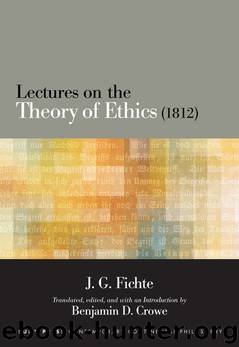Lectures on the Theory of Ethics (1812) by J. G. Fichte Benjamin D. Crowe

Author:J. G. Fichte,Benjamin D. Crowe
Language: eng
Format: epub
Publisher: State University of New York Press
Published: 2016-03-14T16:00:00+00:00
1. HALLE: If no time at all occurs between the appearance of the concept in its complete practical clarity and the willing of it, then time is completely filled by the concept. Then the concept is itself a creator of time. That the concept is clear means that it has reached the point of realizability [Ausführbarkeit] (IV/6, 111).
2. [Original:] Das ist mir die HauptAbsicht, den Grundzug der Sittlichkeit, das formale derselben, in Richtigkeit zu bringen, u. zur Klarheit zu erheben; wie es selbst durch Kant, ohne Zweifel den treflichsten in dieser Materie, nicht geschehen ist, u. drum keine Mühe {sparen}.
3. HALLE: The regular determination according to which time is filled up to a presumed point is the personality and actuality of this very I about which we are speaking. They are all I’s, distinguished only according to the law on account of which time is filled by them. Here we are only talking about the true I, which is merely the life of a higher concept—this [higher concept] first enters the form of the I insofar as it appears as constituting a time (IV/6, 111).
4. CAUER: If it is an I, then the I must remain identical to itself for all eternity, each one in its manner.
5. HALLE: (2) This time can always be filled out in different ways depending on the concept that lies in the background and according to the distinction of whether or not it is living. [It can be filled out] either through inert and indifferent persistence [Verharren], or through willing the concept. In this way two different appearances of this form, which is nevertheless always the form of the I, would arise. A genuinely individual I is always supposed to be identical to itself and thus identical in its filling of time. We are positing the I as a universal form. Yet, there is a particular, personal [I]. This distinctness of the actual, personal I is based on the manner of the filling of time. This principle is being applied here universally, from the highest standpoint. But it is quite certain that the two I’s that are opposed to one another here are distinct according to [the manner] of the filling of time. In the true I, time, which the life of the concept constitutes in an immediate way, drains away. In the second I, time is, on the contrary, constituted by the mere image of the concept. The I, if it is an I, must remain identical to itself for all eternity, each in its own manner (IV/6, 111–112).
6. CAUER: Here there are two questions: (1) Is there such a self-consciousness for all eternity? And (2) How would it look within appearance?
7. CAUER: The particular act of willing ABCD is here undertaken for all eternity [auf all Ewigkeit mit befaßt] and develops out of the one act of will as its ACCIDENT.
8. CAUER: No DELIBERATING or meditating can occur; rather, all of time is filled with the lawful unfolding of duty.
Download
This site does not store any files on its server. We only index and link to content provided by other sites. Please contact the content providers to delete copyright contents if any and email us, we'll remove relevant links or contents immediately.
The remains of the day by Kazuo Ishiguro(7552)
Tools of Titans by Timothy Ferriss(6950)
The Black Swan by Nassim Nicholas Taleb(6192)
Inner Engineering: A Yogi's Guide to Joy by Sadhguru(5897)
Giovanni's Room by James Baldwin(5880)
The Way of Zen by Alan W. Watts(5800)
The Six Wives Of Henry VIII (WOMEN IN HISTORY) by Fraser Antonia(4791)
The Power of Now: A Guide to Spiritual Enlightenment by Eckhart Tolle(4756)
Astrophysics for People in a Hurry by Neil DeGrasse Tyson(4620)
Asking the Right Questions: A Guide to Critical Thinking by M. Neil Browne & Stuart M. Keeley(4576)
12 Rules for Life by Jordan B. Peterson(3734)
The Ethical Slut by Janet W. Hardy(3504)
Skin in the Game by Nassim Nicholas Taleb(3462)
Housekeeping by Marilynne Robinson(3402)
The Art of Happiness by The Dalai Lama(3385)
Double Down (Diary of a Wimpy Kid Book 11) by Jeff Kinney(3276)
Skin in the Game: Hidden Asymmetries in Daily Life by Nassim Nicholas Taleb(3264)
Walking by Henry David Thoreau(3235)
12 Rules for Life: An Antidote to Chaos by Jordan B. Peterson(3204)
